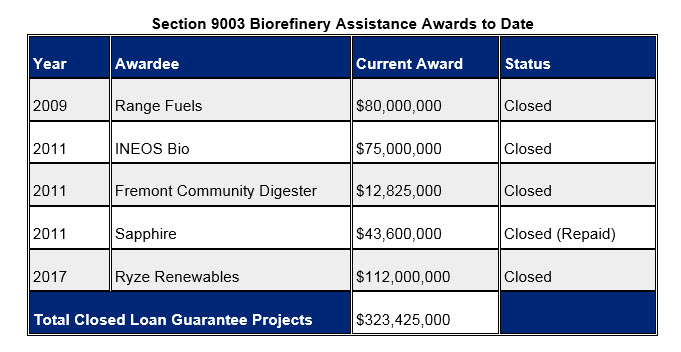Section 9003 Biorefinery and Renewable Chemical Loan Program Gains Momentum
USDA Program Proves to Be Viable Commercialization Path for the Advanced Bioeconomy
HIGHLIGHTS:
- The U.S. Department of Agriculture's 9003 Biorefinery, Renewable Chemical, and Biobased Product Manufacturing Assistance Program (Section 9003 Program) had an unprecedented year in 2017, issuing numerous conditional commitments and closing its first transaction since 2011.
- The Section 9003 Program's success is a result of an improved program structure and technology advancements, in combination with state-level programs such as the California Low Carbon Fuel Standard.
- Along with the Section 9003 Program's relatively low cost of applying and competitive lending terms, this recent success and available capital highlights an attractive opportunity for equity investors and new projects in the bioenergy technology sector.
After years of stalled projects and program improvements, the U.S. Department of Agriculture's (USDA) Section 9003 Biorefinery, Renewable Chemical, and Biobased Product Manufacturing Assistance Program (Section 9003 Program) had an unprecedented year in 2017. During the past six months, the Section 9003 Program has issued numerous conditional commitments and closed its first transaction since 2011. This momentum is a result of the improved program structure and technology advancements, in combination with state-level programs such as the California Low Carbon Fuel Standard (LCFS).
More notably, this creates an attractive opportunity for equity investors and new projects alike, since capital remains available. Accordingly, the Section 9003 Program remains an attractive, viable and proven path to commercialization for bioenergy-related technologies due to its recent successes in combination with the relatively low cost of applying and competitive lending terms.
Program Background: Section 9003 of the 2008 and 2014 Farm Bill authorizes the USDA to guarantee loans of up to $250 million for the development and construction of commercial-scale biorefineries utilizing new and emerging technologies that produce advanced biofuels or renewable chemicals. To date, the Section 9003 Program has been funded through approximately $460 million allocated to cover the program's credit subsidy costs, which could then be leveraged three to four times to fund an approximately $1.5 billion to $2 billion loan guarantee facility. To date, more than 15 conditional commitments have been issued by the program, of which only five have achieved financial close due to various programmatic and awardee-specific developments. For additional background and history on the program, see Holland & Knight's Government Energy Finance Blog post, "USDA Loan Guarantee Funding Solicitation Announced," July 1, 2015.
Program Funding and Outlook: Unlike years past, the Section 9003 Program no longer formally makes an estimated amount of funding available through a biannual Notice of Funding Announcement (NOFA). Instead, the Section 9003 Program remains open on an ongoing basis, accepting applications on April 1 and Oct. 1 of each year until appropriations have been expended. In addition to the closed projects set forth above, approximately $600 million remains committed to projects with active conditional commitments. Those who follow the Section 9003 Program may recognize that this is significantly less than the amounts previously committed to projects. This is a result of USDA's recent action to deobligate hundreds of millions of dollars of conditional commitments, so that additional funding can be made available to projects that have yet to reach conditional commitment and new applicants. Therefore, hundreds of millions of dollars remain available for new applicants interested in entering the program in 2018.
Farm Bill Reauthorization: In addition to this immediate opportunity with the Section 9003 Program, the possibility remains for additional budget authority, and subsequent loan guarantees, through additional appropriations in the upcoming Farm Bill. While specifics on the amount of funding that may become available have yet to be released, the Program is well positioned on Capitol Hill due to its recent success and constituent communication regarding its value to rural America. However, companies in the Section 9003 Program pipeline that have yet to receive conditional commitments should note that the 2014 Farm Bill funding formally expires on Sept. 30, 2018, and the Farm Bill is not likely to be fully reauthorized this year. Therefore, while the Farm Bill waits in the wings as Congress prioritizes immigration and infrastructure, representatives and entities should continue to work with Congress and garner stronger support for the continuation of the Section 9003 Program's authorization and additional appropriations.
Application Materials: The application process, which has remained the same since USDA formally published an Interim Final Rule to the Federal Register on June 24, 2015, has also proven to be conducive to company needs, commercialization timelines and project pathways. The application process includes a Letter of Intent, followed by Phase 1 and Phase 2 submissions. The upcoming Letter of Intent deadlines are March 3 and Sept. 1, 2018. The upcoming Phase 1 submission deadlines are April 2 and Oct. 1, 2018. USDA will invite eligible, competitive proposals to submit a Phase 2 application following a positive determination of a Phase 1 submission. The Program's Application Guide fully outlines the application requirements.
For more information on opportunities related to the program or how to begin the application process, please contact Taite McDonald, Mark Kalpin or Seth Belzley.
Information contained in this alert is for the general education and knowledge of our readers. It is not designed to be, and should not be used as, the sole source of information when analyzing and resolving a legal problem. Moreover, the laws of each jurisdiction are different and are constantly changing. If you have specific questions regarding a particular fact situation, we urge you to consult competent legal counsel.

